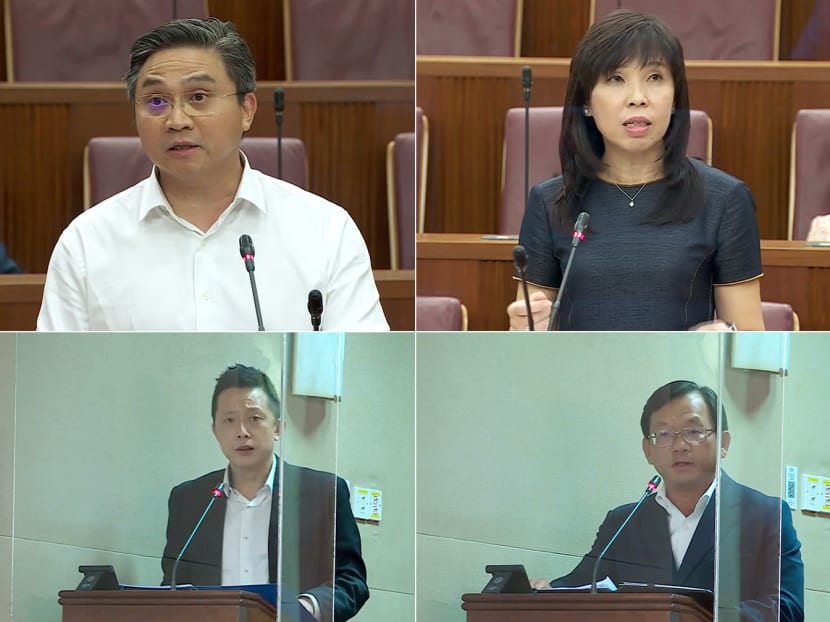Budget 2022 debate: MPs want more support for middle-income workers, propose relooking a segment of property tax hike
SINGAPORE — Greater support for middle-income workers and scrapping of the Workfare scheme’s minimum pay criterion for older low-wage workers were some proposals raised by the ruling People’s Action Party (PAP) during the Budget debate.

(Clockwise from left) Members of Parliament Saktiandi Supaat, Jessica Tan, Chong Kee Hiong and Yip Hon Weng debating the Budget on Feb 28, 2022.
- MPs spent about seven hours debating the Budget in Parliament
- They called for greater support for middle-income workers
- They proposed doing away with the minimum pay criterion for a Workfare scheme for low-wage workers
- Other suggestions included streamlining government processes because there are too many websites and apps for services
- The Government should also reconsider the private property tax hike for a segment of homeowners, they said
SINGAPORE — Greater support for middle-income workers and scrapping of the Workfare scheme’s minimum pay criterion for older low-wage workers were some proposals raised by the ruling People’s Action Party (PAP) during the Budget debate.
During the session on Monday (Feb 28) that lasted about seven hours, 26 Members of Parliament (MPs) and political office-holders spoke, comprising 16 MPs from PAP, six MPs from the opposition parties and four Nominated MPs.
MPs from the Workers’ Party objected to the Budget and disagreed that the upcoming hike in Goods and Services Tax (GST) to kick in in two stages in 2023 and 2024 is the best way to raise more revenue.
PAP MPs were in favour of the Budget but also proposed suggestions such as greater support for small- and medium-sized enterprises, more investments into research and development to stay competitive, increased support for companies to become more environment-friendly and better support for senior workers as the country’s population ages.
One PAP MP also wanted to see a streamlining of government processes, especially in digital services provided to the public.
Mr Saktiandi Supaat, MP for Bishan-Toa Payoh Group Representation Constituency (GRC), noted that the Covid-19 pandemic has disrupted people’s livelihoods.
"Middle-income households also require more help, not just the low-income. The last two years have not been easy for everyone."
He supported the extension of the Progressive Wage Model — which is intended to increase the salaries of lower-wage workers in tandem with them improving their skills and productivity — to security officers, drivers and workers in the retail and food services sectors, but questioned how the Government can boost the wages of middle-income workers.
Among the potential solutions that Mr Saktiandi offered is to raise the salaries of front-line workers, regardless of whether they are lower-wage workers. These could be healthcare workers and adult educators who are private-sector individuals working across the early childhood and student-care fields, as well as universities, private education institutions and international schools.
SCRAP INCOME CRITERION
East Coast GRC MP Jessica Tan appealed for the Government to reconsider the introduction of the minimum income criterion of S$500 a month for the Workfare Income Supplement Scheme.
The scheme encourages eligible workers to work and build up their savings in the Central Provident Fund, which is part of the national social security system, for their retirement, housing and healthcare needs. The Government supplements these workers’ income and retirement savings through cash payments and CPF contributions.
New adjustments will be made to the criteria of who can benefit from the scheme, which include raising the qualifying income limit from S$2,300 to S$2,500 and the extension to younger workers aged 30 to 34. They will take effect from January next year.
Noting this, Ms Tan said that the minimum income criterion will affect older low-waged workers and caregivers who needed the flexibility of part-time work. They would then not hit the minimum income criteria since they earn less than full-time workers.
RECONSIDER A PART OF PROPERTY TAX HIKE
Mr Chong Kee Hiong, MP for Bishan-Toa Payoh GRC, appealed to the Government to reconsider the increase in private property taxes for owner-occupied residential properties on behalf of the older generation of homeowners whose properties are not investment assets.
For private properties, the tax for the portion of annual value in excess of S$30,000 will be raised from the present range of between 4 per cent and 16 per cent to between 6 and 32 per cent.
Mr Chong said: “These are properties that they may have bought long ago. Upon retirement, they have no income and are burdened with the ever-increasing cost of living and now have to pay higher property tax as well. These are their homes, not investment properties that have the rental income to offset the property taxes.”
On another matter related to supporting the burden of increasing cost of living, he also suggested that the Government consider disbursing the GST Voucher – U-Save rebates based on household income per person instead of the size of the recipients’ government-built flat, adding that this would be fairer and more equitable.
Finance Minister Lawrence Wong said in his Budget statement on Feb 18 that all eligible Housing and Development Board households will receive double their regular utilities rebates in April, July and October this year.
These enhanced rebates are part of a S$560 million Household Support Package to provide immediate support for households in the midst of rising inflation and cost of living.
SO MANY APPS AND WEBSITES
In providing services to the public, the Government could better streamline some processes and save costs.
Yio Chu Kang MP Yip Hon Weng said: “Doing more for our people doesn’t necessarily mean we should spend more. Instead, we should challenge ourselves and think hard about what we should spend less on.”
He gave the example of numerous government mobile applications and websites offering similar services, and said that this has resulted in more maintenance required.
It is also inconvenient for residents because they would have to navigate numerous websites and install many apps on their mobile phones.
Mr Yip urged the Government to stop linking spending with performance, and to recognise government ministries that best reduce their expenditure and streamline operations instead.
“The savings can go to the people or be used for more important areas and social programmes,” he added.










